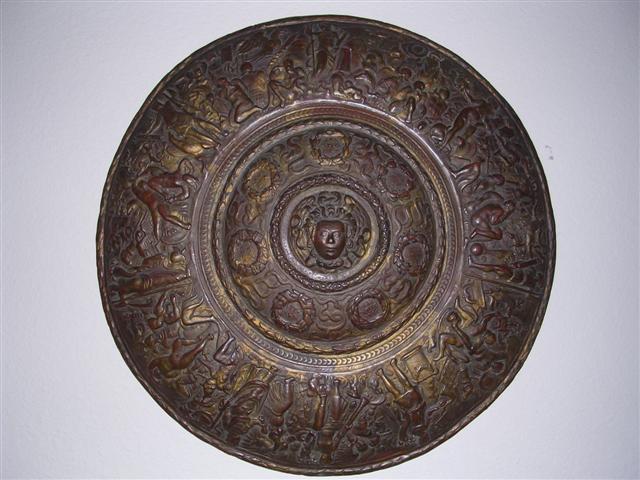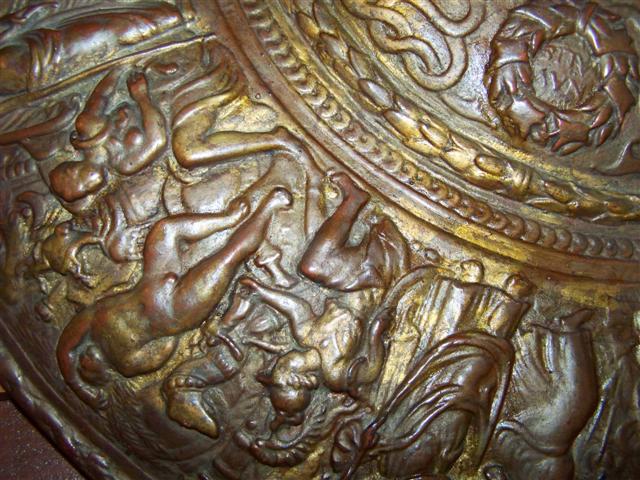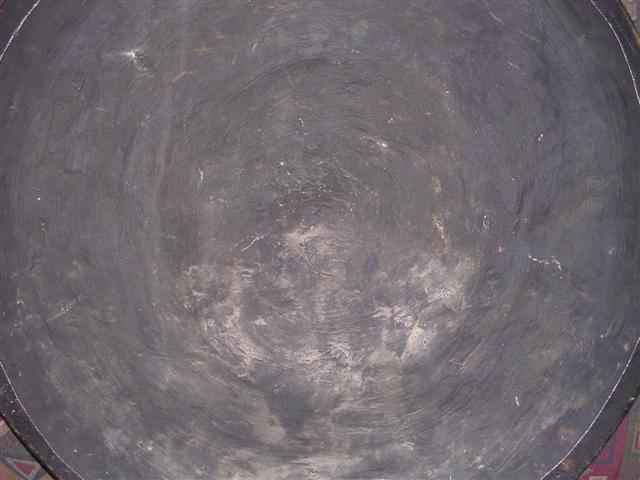| Author |
Message |
|
Julia Tol
Location: Texas Joined: 23 Oct 2011
Posts: 4
|
 Posted: Sun 23 Oct, 2011 7:43 am Post subject: Help-Ernst Schmidt - replica shield ?? Posted: Sun 23 Oct, 2011 7:43 am Post subject: Help-Ernst Schmidt - replica shield ?? |
 |
|
I have a replication of a Jorg Sigman 1552 Medusa parade shield. The original has been housed at the Victoria & Albert museum UK (museum # 3660-1855) since 1855. Here is the url with more detailed info
and pics of the original http://collections.vam.ac.uk/item/O97494/parade-shield/
Has anyone seen a replication of this before? My curiosity is with when it may have been replicated, who might have replicated, how many replications were made, and of course whether there is any value other than my adoration. I did have someone tell me it might be an Ernst Schmidt but have not found any info on this particular shield.
My shield is made of a thin brass or copper then filled with some type of plaster material (homemade pitch?) It is not iron as it wont hold a magnet.
Any information anyone can provide would be greatly appreciated.. Believe it or not I have been researching this shield for 10 years and yesterday I finally found the original so hoping this new info might lead me to answers on the replication. Wishful thinking probably.
I would more than happy to send pics via email of my shield if anyone is interested.. I tried to place as attachment here but guess is over runs the size limitations.
Thanks in advance - Julia
Julia
|
|
   |
 |
|
Gregory J. Liebau
Location: Dinuba, CA Joined: 27 Nov 2004
Posts: 669
|
 Posted: Sun 23 Oct, 2011 2:09 pm Post subject: Posted: Sun 23 Oct, 2011 2:09 pm Post subject: |
 |
|
Very intriguing. Can you post pictures of the replica? The quality of the replication will be a key part of figuring out whether or not someone of Ernst's caliber may have made it! He was quite the replica artist in his time.
-Gregory
|
|
  |
 |
|
Julia Tol
Location: Texas Joined: 23 Oct 2011
Posts: 4
|
 Posted: Sun 23 Oct, 2011 3:18 pm Post subject: Posted: Sun 23 Oct, 2011 3:18 pm Post subject: |
 |
|
Here are some pics of my shield. Obivously it was made from placing the copper/brass over a mold or something as some of the detail is lost from the original. Did Schmidt use molds?Thanks again
 Attachment: 56.35 KB Attachment: 56.35 KB

 Attachment: 86.44 KB Attachment: 86.44 KB

Julia
|
|
   |
 |
|
Julia Tol
Location: Texas Joined: 23 Oct 2011
Posts: 4
|
 Posted: Sun 23 Oct, 2011 4:56 pm Post subject: Posted: Sun 23 Oct, 2011 4:56 pm Post subject: |
 |
|
Here is the back of the shield where you can see the metal over lapping the filler
 Attachment: 43.02 KB Attachment: 43.02 KB

Julia
|
|
   |
 |
|
Julia Tol
Location: Texas Joined: 23 Oct 2011
Posts: 4
|
 Posted: Thu 29 Aug, 2013 4:39 am Post subject: Posted: Thu 29 Aug, 2013 4:39 am Post subject: |
 |
|
Per a letter back from Albert & Victoria museum in the UK: Still cant find out what this copy is worth if anything . Any Ideas?
******
You have an electrotype copy of our Medusa Shield. You can find a lot of information about the original shield here:
3660-1855 Medusa Shield: http://collections.vam.ac.uk/item/O97494/parade-shield/
Electrotypes were made in the 19th century using revolutionary new technology that enabled the mass production of works of art. You can find a lot about the history and reasons behind their production here:
Electrotype table: http://collections.vam.ac.uk/item/O298828/table/
I have not seen many copies of this shield. Elkington and Co who patented the process bought out Franchi and Son who took the mould of our original. I suspect yours was probably made by Elkington in Birmingham soon after the Philadelphia Exhibition of 1876 when several Medusa shields were ordered from Elkington.
Julia
|
|
   |
 |
M. Adair Orr

|
 Posted: Thu 29 Aug, 2013 7:53 am Post subject: Posted: Thu 29 Aug, 2013 7:53 am Post subject: |
 |
|
Julia,
To clarify the process by which this shield was likely reproduced:
A copy via electrolysis means that a plaster mold was taken from the original and a male cast was made from that. This was coated in lead and submerged in a copper sulfide bath. An electric current would cause the copper to accumulate on the surface replicating the form of the original.
The process accounts for the lack of detail in your reproduction, the original being repousse work with hammer and chisels. I wanted to clarify this process because some of the language in preceding posts suggests to me that perhaps you misunderstood. This replica was not likely formed by pressing sheet copper in a closed die. This would have been an enormous expense. Electrolysis was a common technique in the Victorian era for reproducing ornamental metalwork.
I cannot offer any input on the value of this item. I suggest you inquire with auction houses dealing with Arms and Armour. While an interesting curiosity and pleasing decor, I can't imagine that is has great value.
-Adair
[i][b](Edit: I see now that there was a link included in your post from the Victoria and Albert Museum that describes this process. Apologies for the redundancy). [/b][/i]
|
|
  |
 |
|
|

